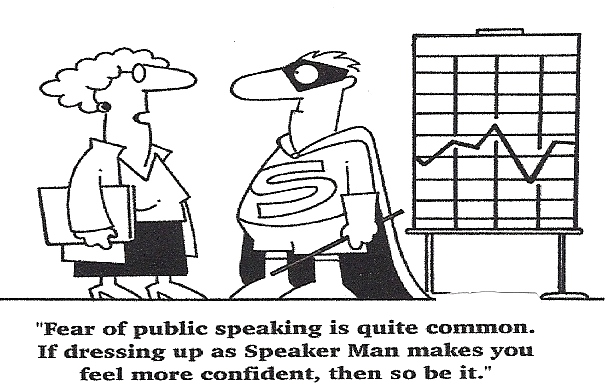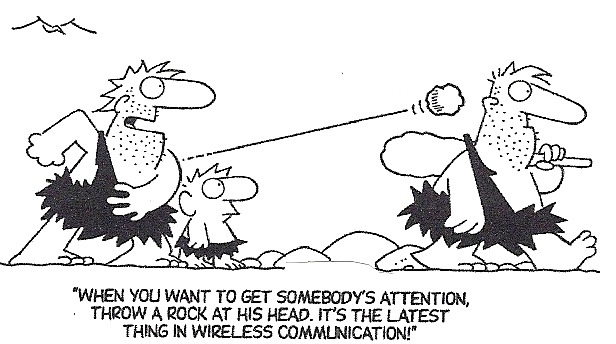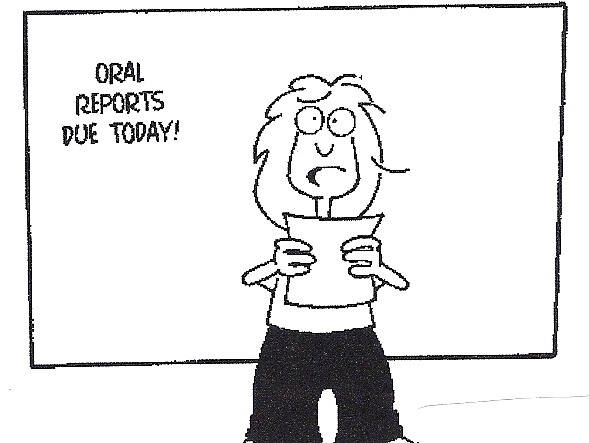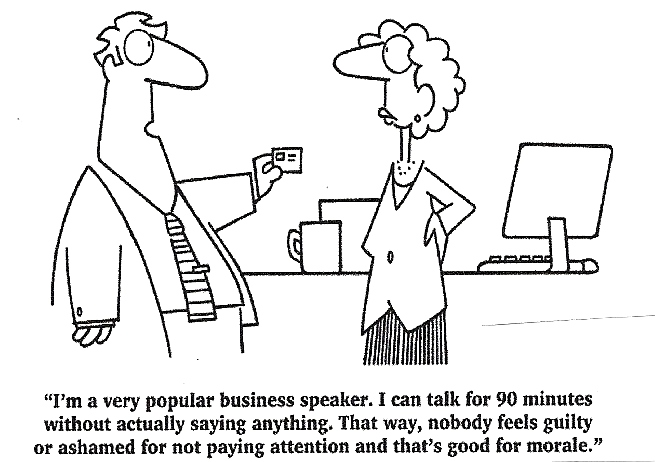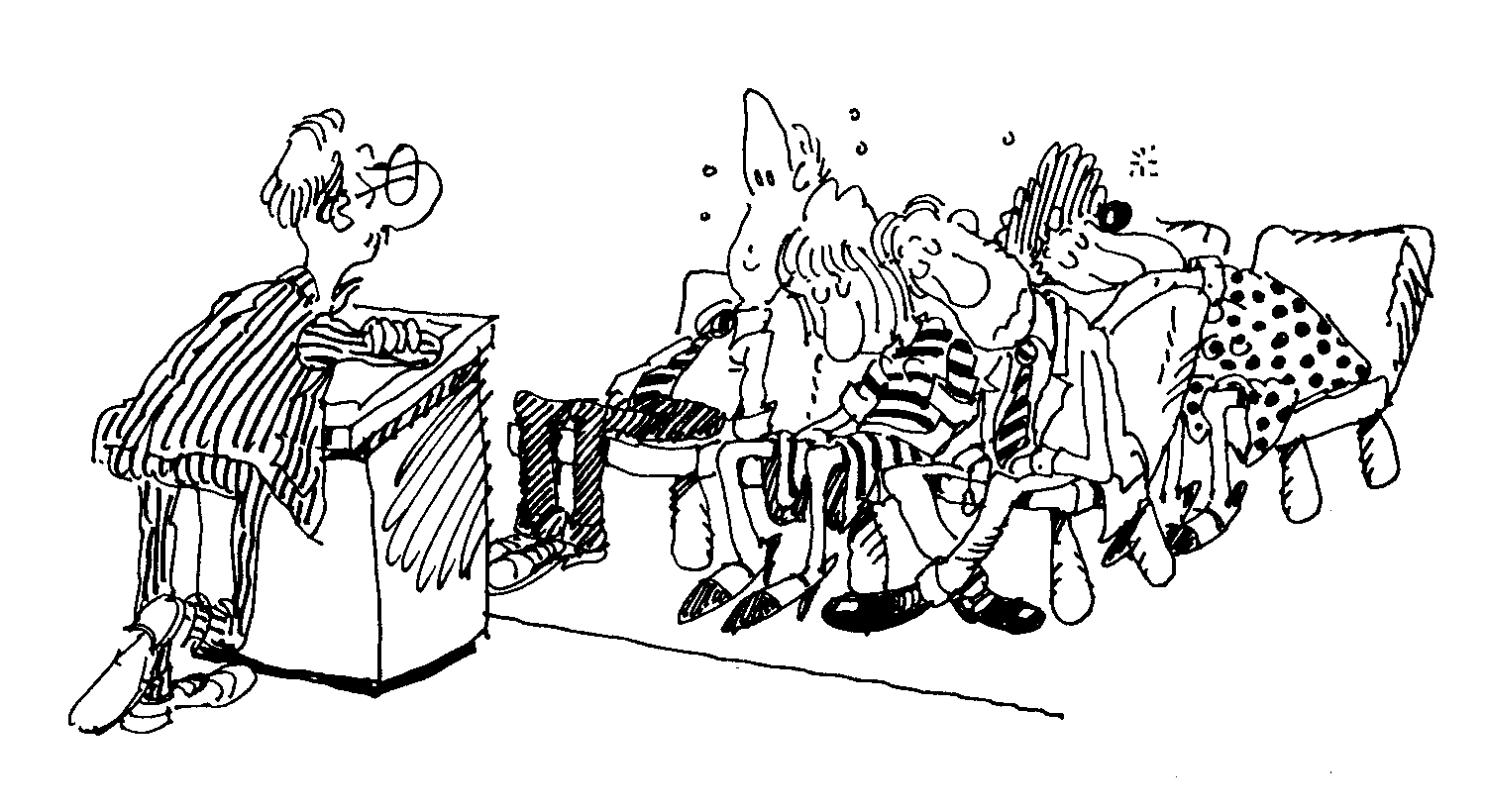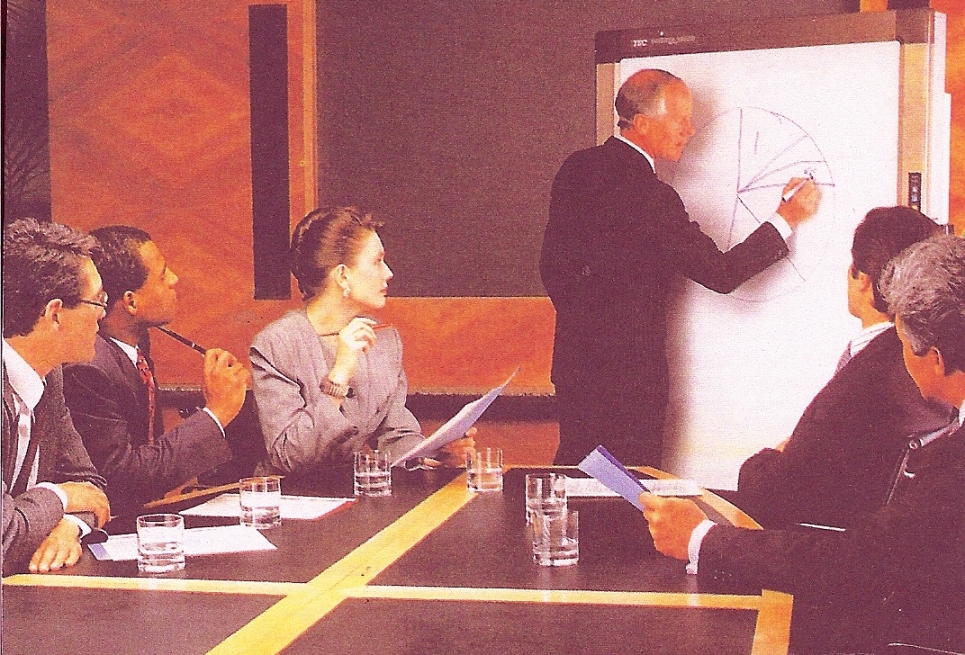
- •Improving Communications
- •Oral communications
- •Written communications
- •7 Tips to become a Good Conversationalist
- •Six Common Mistakes That Spoil Conversations
- •1. Blabbermouthing
- •2. The "take-away" and "me-too" syndrome
- •3. Unsolicited advice
- •4. Interrupting
- •5. Contradicting
- •6. Stingy contributors
- •8 Правил знайомства з діловими партнерами
- •18 Ways to improve your body language
- •6 Чарівних букв
- •Voice and Language
- •Visual aids
- •Fail to prepare
- •No weak opening
- •When I know I have to make a presentation, even a small one before a very limited number of people, I start feeling nervous…
- •When a big meeting is coming up, one that will involve a number of presentations from a range of people…
- •I would say my ability as a presenter is…
- •While I am up on stage, I…
- •Comments about my presentations are generally…
- •If I have to go “off the cuff”…
- •If I could describe public speaking as a food, it would be…
- •Visual aids versus handouts
- •Я к вдало провести ділову зустріч.
- •Introducing the Agenda
- •Introducing the First Item on the Agenda
- •1. What is the desired outcome of the meeting? (How will you know the meeting was successful?)
- •2. Who needs to be there? (And who doesn’t?)
- •3. Is the agenda prepared? (If not now, when?)
- •4. What can I do to prepare? (How can I help others prepare?)
- •5. What can I do to make this meeting succeed? (What is my responsibility?)
- •Discuss the following questions:
- •Exercise 6
- •Negotiating
- •Well, we could make it 7,5 % .
- •The trouble is, the general manager isn't very interested in marketing. He's only concerned about …..5…... If you make it 10%, I might be able to persuade him.
- •But you said…
- •6 Найпоширеніших помилок при проведенні переговорів
- •Communicating with someone in writing
- •The salutation
- •The subject title
- •The body of the letter
- •The parting
- •The signature
- •Inquiries (Enquiries)
- •Поради при написанні ділових листів
- •……………: Always proofread and edit your letters.
- •Avoid the use of …..1….. Words
- •Informal Style Formal Style
- •Identify yourself, if necessary
- •Include necessary information
- •Ten keys to writing an essay
- •Budget your time carefully
- •Read the topic carefully
- •Plan your essay before you write
- •Be sure your handwriting is as clear and legible as possible
- •Follow a clear, logical organization
- •Topic Type a: Contrast/Opinion
- •Use concrete examples and specific reasons
- •Use signal words to indicate transitions
- •Use a variety of sentence types.
- •Check your essay for errors.
- •Електронна пошта
- •Chief, Guy, Sport
- •My Buddy
- •Assumption Junction
- •Peak-a-Boo
- •2 (Suggested answer)
- •Listening 4
- •Contents
- •References
Fail to prepare
In order to present your speech well, you need to be in tip top form - relaxed and full of confidence. Preparation is the key to a successful presentation. If you are well-prepared from your speech materials to presentation visual aids to other aspects of public speaking, you will definitely deliver a persuasive presentation as planned.
No weak opening
Never waste time opening your speech thanking and praising the master of ceremony who has just given the introduction. Stride to the lecturn and get on with it right away. Begin with a bang, so to speak. Surprise your audience with a startling statistics, a short relevant public speaking quotes, or a baffling question. It got to be powerful and relevant to your speech. Grab their attention right from the start.
Don't imitate other speakers
This is one of those common public speaking mistakes or presentation mistakes. Imitating other established speakers. Be yourself. Deliver your speech with your own inimitable style and signature. You can pick up some of their good points and make them into your own. That's one way to improve public speaking. But never imitate them.
Don't read, present
Don't read your speech in verbatim or word for word. You will bore your listeners. Prepare your public speaking outline well. It should contain all the main points of your speech and the specifics of any facts or statistics which you don't have to memorize. Just use it as a guide or a prompter. Check your points and then look into the eyes of the audience, and speak to them.
Never use someone else's anecdotes
Be original. Use only your own personal stories. If it is your own experiences, you will naturally deliver them with more passion and conviction. It would be a big shame to you if someone in the audience knows that your story is a plagiarism. You can borrow short quotes or quotations from other sources, but never someone else's true stories.
Never end questions and answers
You need to close your speech before you go to question and answer session. So, what you should do is, you tell the audience you will take questions and then move to the closing points of the speech. After the Q and A session, conclude it with an interesting quote or call to action.
Remember these six crucial public speaking mistakes. If you are serious about giving powerful speeches or an impressive presentation, avoid these presentation mistakes at all cost.
You are very upset after the presentation you have made. You spent a lot of time preparing it, but everything went wrong from the very beginning. Ask your partner, who is very good at public speaking, to analyze your presentation and give you some
tips.
![]()
We speak with an instrument we call ‘the voice’. The voice reveals who we are and how we are more than the words we choose. And the feelings communicated in the sounds of words are the only truth.
1. Listen to three presenters speaking in different ways and answer the questions below.
Which presenter sounds
fluent and confident?
fluent but boring?
hesitant?
There's a whole market in Eastern Europe just there for the taking.
Quite frankly, the results we've been getting are absolutely incredible.
Now, I'm sure I don't need to tell you just how crucial this is.
Net profits are up ninety-seven per cent - yes, ninety-seven per cent.
Would you believe that so far we've not been able to sell a single unit?
Miss this deadline and we'll lose the biggest client this company's ever had.
2. Why does the boring presenter sound so monotonous?
3. What exactly is the hesitant presenter doing wrong?
2. Deliver all the sentences in 1. in a fluent and confident way. Experiment with longer pauses and stronger stresses. Then compare your version with the recording.
3. According to Swedish businessman Jan Carlzon, 'All business is show business.' Listen to an extract from a radio programme on how several training companies have taken his opinion literally, and discuss the questions.
Would William Freeman's advice help you face a business audience?
What does Michael Lame think classically trained actors can teach business people?
According to Richard Olivier, what makes someone a brilliant speaker?
Which of the trainees' opinions would be closest to your own?
Translate into English.
Існують правила, котрі повинен знати кожен оратор, готуючись до публічного виступу:
бути простим в спілкуванні;
бути відкритим і чітким у вираженні своєї думки;
бути конкретним і лаконічним;
бути врівноваженим та цілеспрямованим.
Не варто починати обговорення тієї теми, в якій взагалі не орієнтуєтеся.
Також не треба запам’ятовивати текст, ви можете користуватися тезами.
І, насамкінець, ще одне: краще, ніж ви самі, ніхто не напише вам текст виступу. Тому найкраще самостійно готувати свій публічний виступ і, до речі, завжди закінчувати його на оптимістичній ноті!
You have just two minutes before you give a talk on one of these topics:
How good public speaking skills can help you in your career promotion?
How you should prepare before giving a speech?
What are the qualities of a good speaker?
How a speaker can keep the attention of the audience?
![]()
|
|
|
|
|
Task 1
Choose one of the articles and take the following steps:
read the article.
identify the main points.
write down 10 questions.
make the vocabulary card (new words, expressions, idioms, etc).
prepare and make one-minute presentation on the issue discussed in the article.
1
A Short Guide to Effective Public Speaking
Delivering an effective speech to 20 or to 200 people is difficult. Because listeners have better access to information since the internet became commonplace, audiences expect more content from speakers today. In addition, because of the entertainment slant of most media today, audiences want a presentation delivered with animation, humor, and pizzazz.
|
|
We all think about how to develop good public speaking skills at a professional level. People have different concepts in their mind and they always think that they will be overlooked by the audience in general. This is the reason why most of the people do not get themselves involved in the public speaking.
Public speaking is a very broad term. Sometimes people get so confused and scared that their tongue gets tied and they meltdown in the public. This is just because of their internal fear. Though they know their topic in depth, because of the internal fear they just break down in public. Some people say that the art of public speaking comes through constant practice and some think that public speakers are born.
How to develop good public speaking skills is a big question for numerous people. There are people who develop public speaking skills in a few months of practice but for some it takes years to develop. But overall it is practice that counts.
It is not that we only require public speaking skills to speak in front of audience or to give lectures. Public speaking skills are an asset that is worth millions. Not only public speaking skills are counted in professional life but are also useful when a person is college student.
For example a student possessing good presentation skills and public speaking skills can do wonders in his grading criteria. All that matters is clarity of delivery element, which is the base of any public speaking skills. It is common sense that on whatever topic you are speaking, clarity is a must because no one would be able to convey your message or whatever you are trying to speak. Unclear words will only show that you have not prepared the subject or you are scared of speaking.
Those people who cannot convey their ideas into words cannot transform their skills in professional life. Some scholars have just passed away with their ideas still left with them just because of the inability to transform ideas. It is true that these scholars were intelligent and conveyed their message through writing. But we all know that written scripts cannot convey the messages effectively compared to speaking.
They simply were not able to put their messages in front of the people of what they actually think. They were unable to speak in front of the public. So, do not let go the importance of public speaking skills.
People also think that public speaking skills and communication skills are not interrelated. But they should know that they are interrelated to a certain degree of extent. However public speaking is a broader term compared to communication skills because people with good public speaking skills have good communication skills.
But this is not the case with the people possessing good communication skills, because people with good communication skills may or may not have good public speaking skills. There are many reasons behind why people with good communication cannot speak in public. The reason behind why people are unable to speak in front of pubic is fear. Most of the people are scared and have fear while speaking in front of the public.
They get nervous and their heartbeat gets fast resulting into unclear words and stammering. There are numerous ways to enhance public speaking skills. No doubt apart from the practice you should have a great storage bank of vocabulary in your mind. You can practice public speaking skills speaking in front of your family members, friends and colleagues.
Gradually your fluency will increase along with your vocabulary. Once you are able come out of your fear, you can be a good public speaker. Do not forget that possessing good public speaking skills in a big asset.
2
Annoying public speaking habits
Here are some annoying public speaking habits. They can be deal breakers, so avoid these annoying habits at all costs!
Voice Trailing Off – Many speakers let their voices trail off at the end of every sentence. The audience can hear the first part of their sentence, but they have no idea what pearls of wisdom might be lost in the whispers at the end.
Looking Down – Sometimes this speaker will deliver complete sentences inaudibly while looking down — obviously not interested at that moment in engaging the audience.
Mumbling – Mumbling is not cool. Inexperienced speakers will often speak at conversation level, not giving any thought or consideration to the people in the back of the room. Recently, I sat in on a panel discussion at a workshop. The panelists chose to sit instead of stand to address the standing-room-only crowd, which I thought was rude. And one man, whenever it was his turn to speak, would rest his elbows on the table and fold his hands in front of his mouth during the entire time that he was speaking.
Reading – Some speakers are not good readers. If you are not skilled at reading something out loud, don’t do it while speaking. Especially avoid doing this secretly. In other words, if you plan to deliver your speech by reading all or part of it, and you do not have good out loud reading skills, forget it.
Not keeping everyone involved - Inexperienced or thoughtless speakers leave members of the audience out. When an audience member asks a question, it is rarely heard in the back of the room. I’ve seen many expert speakers respond to the question by engaging in a one-on-one conversation with this person while the rest of the audience is left wondering. Speakers, I urge you to repeat the question so everyone is on the same page. And then respond to the question so that everyone in the room can hear it.
Sitting Down – Some speakers choose to sit down on the job. In a very small, intimate group or when the audience is sitting in a circle of chairs or on the floor, for example, speaking while seated is generally okay. But if you have a room containing six rows of chairs or more, you really should express respect for those in the back of the room by standing so that you can be seen as well as heard.
Filler Words – Even some professional speakers still use too many filler words. It takes practice, but you can rid your vocabulary (especially while speaking in public) of those filler words like, uh, ah, er. Also avoid connecting sentences by overusing “and.”
Overshooting Time Allotment – Many speakers have trouble staying within the time allotment. Most programs or presentations are carefully organized. Each segment is designed to fit into a specific time slot. I’ve seen speakers completely disregard their time constraints and foul up the entire evening’s program. Not cool.
Task 2
Choose one of the articles and render it into English.
1
Ефективний публічний виступ
Публічним виступом може бути, як виступ на конференції, лекція, так і тренінгове заняття. Чому так важко вийти перед аудиторією і донести інформацію, яка потрібна і цікава для слухачів? Чому ми намагаємось зробити це найшвидшим способом і забути про це? Але ж ми залишаємо в пам’яті людей певну інформацію, враження про себе як фахівця чи науковця. Зіпсувати дуже легко і просто, а залишити про себе хороше враження і донести цікаво інформацію – це майстерність. Крім того, що виступ перед публікою повинен бути структурованим, містити елементи жартів та мати чітко сформульовані цілі, він має приносити нам задоволення. Перед виступом варто проаналізувати аудиторію за принципом «своя-чужа». «Своя» людина – це та, з якою нас щось поєднує. Коли аудиторія сприймає нас, як «чужого», в неї спрацьовує інстинкт самозбереження. Він виявляється у агресивній поведінці, напруженні, аудиторія не сприймає та критикує будь-яку інформацію. Сильний вплив на аудиторію має комплімент. Він повинен бути коротким, не повинен мати двозначного значення і бути щирим. При використанні компліменту варто використовувати форму перебільшення (наприклад: дуже, прекрасно і інші), порівняння (гарно, як…), використання інтонації. Можна робити комплімент не окремій людині, а тому, до чого вона має відношення: робота, місто, в якому вона живе, приміщення, в якому працює. Сконцентрувати увагу потрібно на аудиторії, на слухачах. І на завершення розглянемо закон композиції. Закон композиції діє всюди: в музиці, в літературі, кіно. Людина проживає життя за законом композиції. Таким чином, виступ повинен складатись з таких частин:
Вступ передбачає формування емоційного фону в аудиторії. Особа, яка виступає, розповідає про себе, тему, коли можна задавати запитання, про свої відчуття. В основній частині висвітлюється суть, пропонуються шляхи розв’язання ситуації, йдеться про проблеми, вирішення яких є у нас на меті, проблеми, які існують чи можуть існувати, але наші пропозиції повинні вирішити ці проблеми. Перед заключною частиною знаходиться кульмінація – це ключовий момент виступу. Заключна частина – це емоційний фон після завершення виступу. Нагадуємо з чого починався наш виступ, про що йшлось і до якого висновку чи вирішення спільно дійшли. Отже, як бачимо, що страх перед публікою не дає нам можливості розкритись перед аудиторією. Страх бути смішним сковує нас, робить виступ банальним і механічним. А використання у виступі жартів, компліментів дає можливість привернути аудиторію до нас, формує позитивне ставлення та приносить більше користі для самої аудиторії. Формування цілі виступу допоможе нам подавати інформацію послідовно, систематично і доступно для слухачів. |
2
Як подалати страх публичного виступу
Шановна, за два тижні ми готуємося до організації зборів, на яких Вам потрібно буде виступити. Всього хвилини на сім - десять.
Виступити? Ні, я не можу. Я не знаю, що говорити?
Ну, що Ви, розкажіть про Ваш досвід. Та Ви зможете, тільки про свою роботу і все. Я у Вас вірю..
Вам знайомий такий діалог, ну або хоч би приблизно такий? Якщо так, то Ви, напевно, відчуваєте в даний момент легке тремтіння, дихання починає ставати переривистим, пульс частішати. Що це? Це страх публічного виступу. Які думки виникають в перші хвилини після того, як Вам оголосили про необхідність виступити?
Чому я?
Я не знаю, що говорити.
Я не зможу.
Я не вмію.
Можливо, піти на лікарняний?
Відмітьте, страх навіть у внутрішніх думках. А Ви замислювалися коли - нібудь, які причини такого страху? Чому ми з легкістю і задоволенням спілкуємося з великою кількістю родичів і боїмося виступити перед групою навіть з трьох чоловік? Чи можна навчитися справлятися із страхом публічного виступу?
Щоб його перемогти, потрібно знати всі його таємниці, його суть, його слабкості. Отже, спочатку розберемося, що таке страх і його причини, а потім подивимося, як працювати зі своїм страхом. Насправді, страх переслідує людину все його життя, починаючи з перших хвилин існування. Пробачите за тавтологію, але мені здається, що страшний не сам страх, а той як ми поводимося в той момент, коли нам страшно. Що ж є причиною страху перед публічним виступом і як з ним працювати? В основі страху може лежати цілий комплекс об'єктивних і суб'єктивних причин: боязнь виглядати недосконалим; додання дуже високій значущості виступу і можливим помилкам; перебільшення власних недоліків; недоброзичливість аудиторії; погана підготовка або спогади про минулі невдачі. У кожної людини ці причини свої.У страху перед виступом незаслужено погана репутація внаслідок того, що в наявності його негативні наслідки. При цьому забувають, що саме страх примушує нас ретельніше готуватися.
Як працювати із страхом?
Перетворите страх - в трамплін
Які б неприємності вам не загрожували, найгірше - не зробити презентацію взагалі. Розглядайте страх, як трамплін, що дозволяє Вам злетіти вище, на відміну від ситуації, якби його не було.
Пам'ятаєте, що Ви маєте право на помилку
Боязнь виглядати недосконалим в очах тих, що оточують нерідко зупиняє нас. Але що робить чоловік, коли падає? Він піднімаєтся. Навіть, якщо заподіяні важкі каліцтва, людина прагне піднятися.
Пам'ятаєте, що відмова від дій є значно більшою помилкою, чим дії з помилками. Долайте той бар'єр, який створює страх. Як? Рішучістю, бажанням діяти.
|
|
![]()
Presentations skills and public speaking skills are very useful in many aspects of work and life. Effective presentations and public speaking skills are important in business, sales and selling, training, teaching, lecturing and generally entertaining an audience. Developing the confidence and capability to give good presentations, and to stand up in front of an audience and speak well, are also extremely helpful competencies for self-development too. Presentations and public speaking skills are not limited to certain special people - anyone can give a good presentation, or perform public speaking to a professional and impressive standard. Like most things, it simply takes a little preparation and practice.
![]()
Now listen to six business people giving advice about presentation techniques. Match each extract with one of the questions below.
What is the purpose of a presentation?
What percentage of the success of a presentation is due to preparation?
What do you need to know about your audience?
If the content is good, the presentation will certainly go well. To what extent is this true?
What methods can you use to structure your presentation, and to show this structure to your audience?
How can you avoid a presentation being a platform to show off how much you know about a certain subject?
A
Quotations on presentations
Give your comments on the quotations below.
It takes one hour of preparation for each minute of a presentation.
Top presenters have total control of their fears. They make fear their slave, not the master.
Be sincere, be brief, be seated.
I do not object to people looking at their watches when I am speaking. But I strongly object when they start shaking them to make certain they are still going.
No one can remember more than 3 points.
A great speaker is first a great person who happens to speak well.
B
Answer the following questions:
What is a presentation?
For what purposes are presentations made in business?
What do you need to know about your audience?
What makes a presentation effective?
What is the worst presentation you have ever experienced?
Can you recall a memorable presentation you’ve seen? What was it that made the speaker unforgettable?
Do you enjoy giving presentations or generally try to avoid them?
Even experienced presenters can make mistakes during a presentation. Can you give any examples?
C
Think of a good presenter you know. Explain why he/she is a great speaker. What makes a good presenter? Choose 3 core factors and explain why they are vital.
What other factors are important? Discuss them with your partner.
|
6) persuasiveness 7) enthusiasm 8) honesty 9) directness 10) flexibility |
D
Being a skilful presenter takes a lot more than preparation and practice. Good presenters also possess certain skills. What are they? Discuss with your partner and make notes on the characteristics of a good presenter.
Then study the following list and put a tick (v) next to the ones you possess. No individual will meet all the points, but the successful presenter will make a conscious effort to continually improve his/her presentation skills.
A good presenter should be……..
· an excellent communicator with a clear speaking voice
· extremely well informed about current events in the area you are covering
· able to communicate with a live audience
· able to work as part of a team
· able to take constructive criticism
· capable of writing their own scripts if necessary
· capable of staying calm under pressure and be able to react positively in a crisis
· be able to use technical equipment
· be accurate and organized
A good presenter should have……..
· A gregarious personality and a confident manner
· Fantastic improvisation skills
How many ticks do you have on your list? Can you add any other qualities to the list?
E
Here is some advice for presenters. Put a cross against any of the advice you don’t agree with and briefly explain why.
Preparation
Arrive one hour early.
Meet, touch, and talk to the attendees before the presentation begins.
Memorize the first two minutes.
Use cheat sheets to write down the first three to five words you will say for each key item.
Have something showing on the screen when they walk in – the title page of your presentation.
Opening
In the first twenty minutes you must:
Capture their attention and interest
Tailor to the audience
Convey the perception that your presentation was created just for them.
Eye contact
We speak to people through our eyes. Look at the audience. More specifically, look directly at one person in the audience for three to five seconds.
The close
The most important part of the presentation is the close. They will remember best what they hear last. You should write out the last two minutes of the presentation and memorize it.
Questions and answers
Don’t ask ‘Are there any questions?’ – You’re likely to get dead silence. A better way would be to ask ‘Are there any questions about the twelve techniques?’ If you don’t know the answer or aren’t sure – don’t bluff.
F
Read the comments from the audience who are listening to a presentation. What caused a problem in each case?
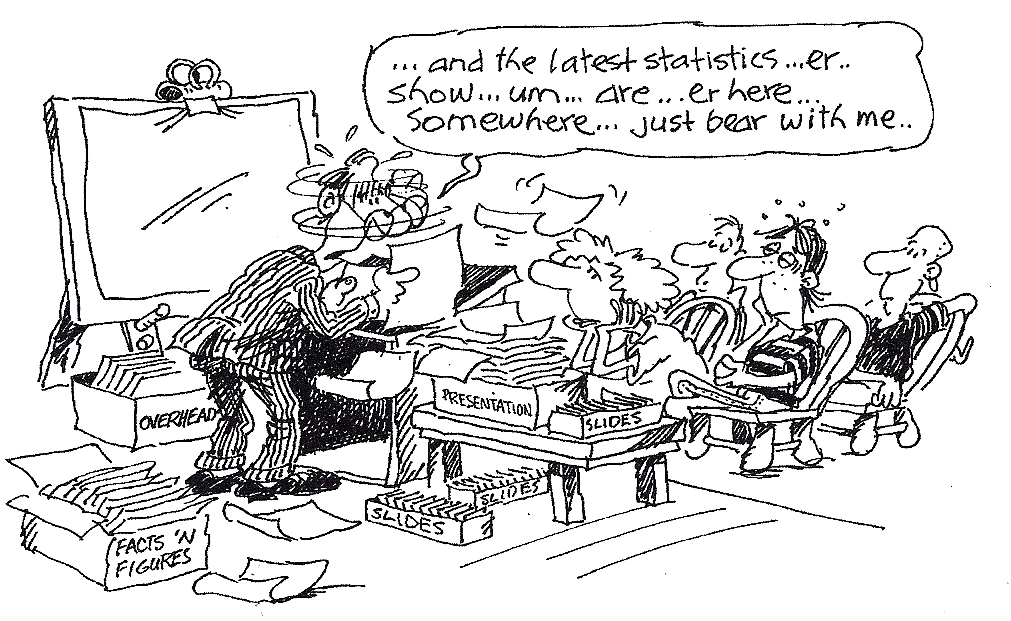
‘What on earth is he talking about?’ ‘I’ve no idea!’
‘Hey, Sarah! Wake up! He’s finished!’
‘Read that! I can’t read that I’d need a pair of binoculars!’
‘Speak up! I can’t hear a thing!’
‘Summarize four main points? I only noticed one! Have I been asleep?’
Go on with the list of comments and ask your partner to define the problem in each case.
Are you a good presenter?
Take this little quiz and find out…

